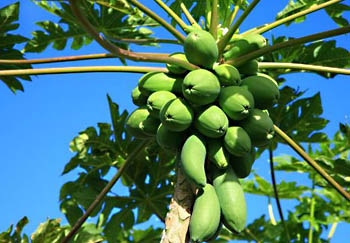La Chambre mexicaine du sucre se prépare à augmenter les exportations de canne à sucre aux États-Unis. Les acheteurs américains préfèrent toujours davantage le sucre de canne à celui de la betterave. L’une des raisons de ce revirement tient au fait que les betteraves sucrières sont souvent génétiquement modifiées. Depuis que l’Etat du Vermont a introduit l’obligation d’étiquetage GM, les producteurs qui désirent désormais passer aux édulcorants sans OGM sont toujours plus nombreux. Une autre raison réside dans la forte demande des consommatrices et consommateurs en produits sans OGM. En dépit de la hausse des importations de canne à sucre, la majeure partie du sucre utilisé aux États-Unis provient de de la betterave. (Bloomberg, 12.4.16)
Quelle: Bloomberg, 12.April 2016
http://www.bloomberg.com/news/articles/2016-04-11/mexico-ready-to-ship-more-sugar-to-u-s-as-buyers-snub-beets?utm_content=bufferf1f4d&utm_medium=social&utm_source=twitter.com&utm_campaign=bufferht
Mexico Ready to Ship More Sugar to U.S. as Buyers Snub Beets
Mexico’s sugar chamber says the domestic industry has enough of the sweetener made from cane to ship to the U.S., as more American buyers shift away from supplies made from beets.
“The U.S. government is evaluating, and we are waiting” official supply estimates to see if the nation is “going to have bigger sugar requirements,” Juan Cortina, president of the chamber, said Monday in a telephone interview from Mexico City. U.S. industrial buyers are seeking more cane sugar because of fear of public backlash over genetically modified beets, used to make the bulk of domestically produced refined sweetener.
Prices for U.S. sugar made from cane have climbed 6.8 percent in 2016 as demand drops for the beet supplies. By contrast, world prices have slumped 5.6 percent. The U.S. Department of Agriculture will update its crop forecasts for production, imports and use on Tuesday.
While Mexico has no interest in renegotiating so-called suspension agreements signed in 2014 that set price limits and volume quotas, it has told U.S. authorities that it has between 300,000 and 500,000 metric tons of additional supply available should the country require it, Cortina said. The country is currently set to ship 1.2 million tons of sugar this season to the U.S. A Reuters report this month said that U.S. refiners were seeking to rework agreements settled in late 2014.
The Washington-based American Sugarbeet Growers Association didn’t respond to calls or e-mails seeking comment. The American Sugar Alliance declined to comment on whether the industry is seeking more imports and on issues regarding GMO beets.
Consumer concerns over GMO crops have been growing, prompting a new Vermont state law that goes into effect July 1, which will require labeling for food products made with the plants. Kellogg Co. and Mars Inc. are among companies that have said they will apply the labels to all U.S. products in anticipation of the legislation. Some food makers, including Hershey Co., are finding ways to decrease GMO use.
“We are now buying only cane sugar for our products,” Jeff Beckman, a spokesman for Hershey said by e-mail April 1. The decision “is about being consumer-centric and listening to what consumers want and expect from our products. Non-GM ingredients is something our consumers are telling us is important to them. Even with the shift to cane sugar, the majority of the sugar we use in our U.S. products today is



